- Homepage
- Gluten
Meaning of gluten
This page on the meaning of gluten is for those who do not want to give up bread unnecessarily and are wondering what the alternatives are.
There is good news to be had but only if you are prepared to ferment and bake your own sourdough; the preparation time is only five minutes but then you have a long waiting-period. Today's loaf will only be cooked tomorrow.
The protein in wheat is made up more or less of equal quantities of two nutrients.
- Gliadin which gives the dough its thick, sticky nature and makes it extensible.
- Glutenin that is responsible for the dough's strength and elasticity.
When exposed to water these proteins combine together to form gluten; their elastic-properties enable the dough to balloon and rise after trapping the gas generated by the yeast.
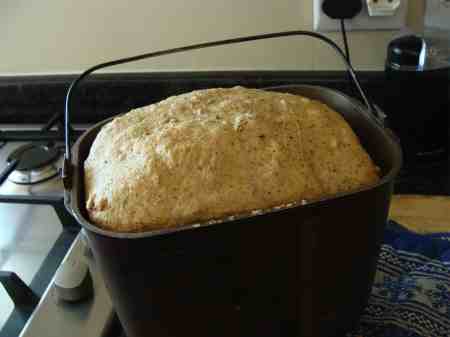
This page was updated by Bernard Preston on 29th November, 2024.
Meaning of gluten
Actually there are several types of gliadin and glutenin but there is no need to go into that depth.
There are differences in the gluten proteins but typically it is those in wheat, rye and barley that are the prime suspects when it comes to ulcerative-colitis.
These two substances are just some of the many sources of the amino-acids that the human body uses to build up the unique proteins, according to our own DNA. Most we get from meat, eggs and dairy products; fish and legumes too.
About 10% of the dry weight of wheat consists of protein; the amount varies considerably.
In the consideration of the deleterious-affect of gluten on some folk, we will only consider gliadin; that is the real spoke in the wheel.
Gliadin
Gliadin consists of long chains of amino acids, concerning if they are not properly digested and broken down into individual units; in particular it is rich in the problem child for those who are gluten-sensitive, namely proline.
It is these undigested fragments of gliadin that when absorbed set up the autoimmune reaction to gluten causing a very serious disease called celiac-sprue.
Glutenin on the other hand has less proline but in fact is one of the largest protein molecules found in nature, giving dough its unique elastic-properties.
Gluten sensitivity
Gluten sensitivity has been increasing dramatically in the last 50-years; researchers in Sweden found that the abrupt introduction of relatively large amounts of flour to babies when women stopped breastfeeding was a very important causative factor.
Instead they recommend a gradual increase in wheat products from about 6 months, whilst continuing to breastfeed.
The prevalence of frank coeliac-disease is still only about 1%. Interestingly poorer people are less prone; relative wealth makes refined carbohydrates more available to children from a much younger age.
It is claimed by the Real Bread movement in the UK that those
enjoying baked products made with completely unrefined 100% flour and no added enzymes are
far less likely to become gluten-intolerant.
Nevertheless up to 10% of people feel that they are sensitive to wheat; and that indigestion of one sort or another is lessened by avoiding those grains containing gluten.
This is thought to have been greatly exacerbated by
the addition of certain enzymes to commercial baking in the last 70 years, changing the structure of the gluten into a different form; one that they
react badly to.
Gluten-free foods
What is seriously problematic is when concerned people replace these grains with white rice and other refined starches. Most gluten-free foods are highly processed.
"We need to look at our meals as a whole; if we reduce the amount of one food, it is important to choose a healthy-replacement."
- Cardiovascular Research, July, 2021
A better option is replacing the flour not with refined starches but with whole grains like brown-rice, maize or rye; quinoa and buckwheat too have no or little gluten.
Using the sourdough method to bake improves the proper digestion of the protein in flour.
Proline and glutamine
These are two non-essential amino acids; there are difficulties digesting gluten which is rich in proline and glutamine is the most abundant in our bodies.
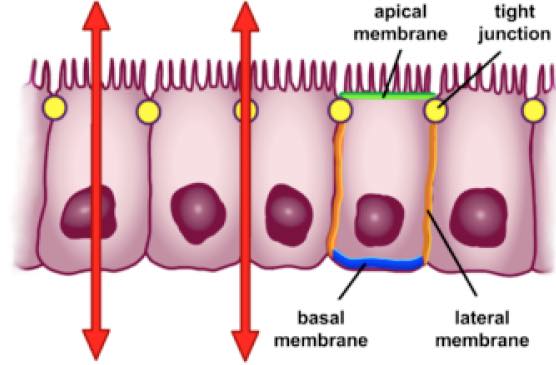
"We showed that these proline and glutamine-rich epitopes are exceptionally resistant to enzymatic processing in the gut."
- Hausch et al[1]
Gluten consists of long chains of amino acids, of which proline and glutamine constitute a large fraction. Fortunately neither are on the essential list and can be synthesised in the body from others; humans can survive perfectly well without wheat.
However there is much research indicating that those who regularly enjoy 100% whole grains are much more hale and hearty; they are the best sources of vitamin E and many of the B-complex. The bran not only provides bulk for the stool but also slows gastric emptying and the absorption of glucose into the blood stream; it's particularly good for those who are prediabetic.
The problem researchers have found is that gluten is exceptionally resistant to enzymatic processing in the gut of some people; the result is that partially digested fragments are absorbed into the body at the brush border membrane where they stimulate a T-lymphocyte immune reaction[1].
This is an inflammatory response in which the body reacts badly to its own tissues.
Normally the small intestine has a rug-like epithelial lining, with villi projecting into the lumen of the gut, increasing the surface area where absorption of these amino acids occurs; but they slough off in this inflammatory process and are seen in the stool. That is why those suffering from Coeliac Sprue and Crohn's disease also experience malnutrition.
Notice in particular the tight junctions in the graphic above which serve to prevent the penetration of these partially-digested fragments of amino acids, known as peptides.
In people who are gluten sensitive, some of these partially-digested peptides may penetrate the tight junctions producing an immune response to these short chains of amino acids that are considered foreign proteins.
Amino acids have variable carbon chains, R below, with carboxyl and amine groups situated in different positions.
This gives each amino-acid its unique character.
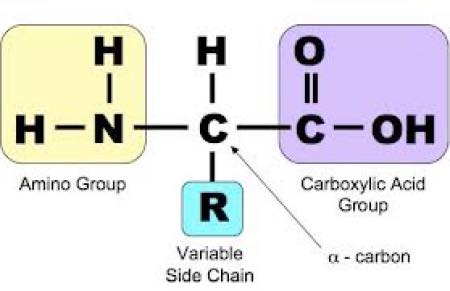
Glutamine, seen below, in fact has two NH2 groups. This type of structure is typical of all the amino acids except proline.
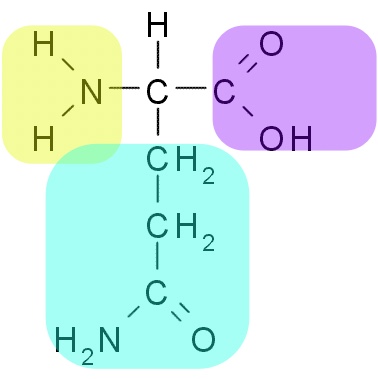
Proline is believed to be the chief problem child. It has a circular structure, known in chemistry terms as an aromatic ring; can you see it below?
Four carbon atoms and one nitrogen in a ring-structure is quite different to all the other amino acids.
Something to do with this ring structure apparently is why it is more difficult for the enzymes in the small intestine in gluten intolerant folk to break the peptide-chain down into individual amino acids.
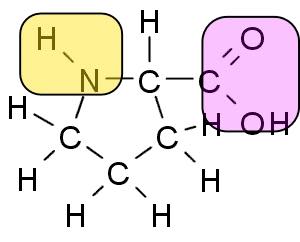
In its most severe form this absorption of peptide fractions causes a serious condition known as Coeliac disease; a toxic reaction to partially undigested gluten. Symptoms can confusingly be either chronic diarrhoea or constipation. Abdominal bloating, pain and weight loss are typical; and fatigue too, often associated with iron-deficiency anaemia.
Life-long abstention from those grains containing gluten was formerly considered the only solution.
Meaning of gluten
Meaning of gluten goes into some of the chemistry which you may need to understand if it is your desire to continue enjoying wheat products but not suffer from the undesirable effects of eating bread.
There is in fact good news for most sufferers of Coeliac disease; there is a solution. It is called sourdough bread.
There is an extended exposure of the dough, much longer than you would get from the conventional loaf, to a concoction of Lactobacillus, other friendly bacteria and wild yeasts; they will break down these polypeptide fragments before they even enter your mouth as a slice of bread.
Researchers found that the majority of a group of folk with serious Coeliac disease could in fact enjoy sourdough bread with no reaction, provided it was prepared in a particular way; long exposure to the bugs and using low-gluten flours. And of course avoiding the enzymes that the baking industry adds to the mixture.
Refined starches
Researchers are very concerned that those with supposed gluten issues are replacing wholewheat with highly-refined alternatives.
It is abundantly clear that removing one refined starch from our daily food, say a cookie and adding a wholegrain alternative such as corn on the cob has a profoundly good influence on our all-cause of death[6]. Doing the opposite is a huge negative.
Another issue is the removal of lignans in the refining process; they are central to the prevention of malignant breast tumours and cardiovascular disease. It's no mystery that poor health prevails.
The material expressed on this page is gleaned from the nutritional and environmental literature; it is clearly referenced. A plain distinction is made between the author's opinion and that which is scientifically proven. When in doubt consult your health professional.
To suggest a correction or clarification, write to Dr Bernard Preston here. Contact.
Coeliac vs Crohn's disease
Coeliac-disease is an autoimmune condition in which your body attacks itself when exposed to the gluten found in wheat, barley and rye; and sometimes oats. There are only two possible solutions.
- Avoid those grains.
- Or better still eating them only when they have been exposed to the predigestion of the sourdough process.
This fermentation process has to be done in a particularly thorough and specific way; sourdough bread off the shelf in the supermarket probably will not do. It needs a long time.
Crohn's disease on the other hand is an inflammatory bowel condition, more prevalent in the obese and rather different to that of a Coeliac patient. In many ways they are similar though.
Obesity is associated with high levels of inflammatory cytokines; this is probably one of the causes of the severe reaction experienced by those with Crohn's disease to gluten. Regular consumption of homemade probiotics like kefir or sauerkraut is an important part of the solution.
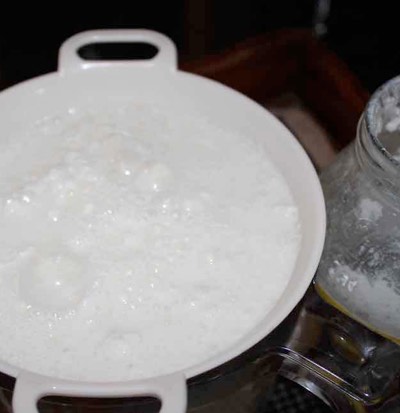 Actively fermenting kefir can be made in just 3 minutes at home
Actively fermenting kefir can be made in just 3 minutes at homeDiarrhoea is common to both. They tend to have abdominal-pain,
cramping and indigestion; and weight loss. Rectal bleeding is a feature
too as the lining of the bowel sloughs off. Anaemia is frequently an
associated sign.
The distinction often has to be made by use of a biopsy of the lining of the bowel; from a colonoscopy or perhaps via the stomach.
Obese Crohn's disease patients may in fact be able to eat gluten-rich grains baked using the sourdough method, provided they lose weight. The longevity diet is one of the few that has some merit; it is readily sustainable.
These are all variations of what is generally known as Inflammatory Bowel Disease or IBD.
Ulcerative colitis is another of these autoimmune conditions but, unlike Crohn's disease affects only the colon and rectum; it is thus less likely to cause the malnutrition of those IBDs that inflame the small-intestine.
It takes a specialist to make the diagnosis; understanding the meaning of gluten appears to be the key to coping with IBD.
Newsletter
Our newsletter is entitled "create a cyan zone" at your home, preserving both yourself and Mother Earth for future generations; and the family too, of course. We promise not to spam you with daily emails promoting various products. You may get an occasional nudge to buy one of my books.
Here are the back issues.
- Lifestyle and ideal body weight
- What are ultra-processed foods?
- Investing in long-term health
- Diseases from plastic exposure
- Intensive lifestyle management for obesity has limited value
- A world largely devoid of Parkinson's Disease
- The impact of friendly bacteria in the tum on the prevention of cancer
- There's a hole in the bucket
- Everyone is talking about weight loss drugs
- Pull the sweet tooth
- If you suffer from heartburn plant a susu
- Refined maize meal and stunting
- Should agriculture and industry get priority for water and electricity?
- Nature is calling
- Mill your own flour
- Bake your own sourdough bread
- Microplastics from our water
- Alternative types of water storage
- Wear your clothes out
- Comfort foods
- Create a bee-friendly environment
- Go to bed slightly hungry
- Keep bees
- Blue zone folk are religious
- Reduce plastic waste
- Family is important
- What can go in compost?
- Grow broad beans for longevity
- Harvest and store sunshine
- Blue zone exercise
- Harvest and store your rainwater
- Create a cyan zone at your home
Non-coeliac gluten sensitivity
Gluten intolerance comes in another form where all the tests for the autoimmune diseases are negative. Folk react badly to wheat with many of the same symptoms; abdominal pain, diarrhoea and fatigue. Skin rashes are not uncommon too.
If all tests are negative and you improve by removing wheat then it's known as non-coeliac gluten sensitivity; the proof is that the symptoms return when you again add it to your meals.
So recognise though that there is a great difference between commercially-made bread and sourdough; chalk and cheese. Added enzymes and short proofing times are frequently the cause. The meaning of gluten is central to your understanding of this complex subject.
Wheat gluten intolerance and whole grains are inseparably intertwined; ever since industrial milling with extraction of the bran and germ began about 150 years ago, sensitivity to the protein in flour has been on the rise.
The mind is a strange creature
Although certainly less than ten percent of Western folk suffer from one or other form of gluten-intolerance, nearly a third of Americans are trying to avoid it; and clearly feel they have benefited.
The problem is that they often replace wholewheat products with ultra-refined carbohydrates, mainly white rice, cornmeal and potato flours. This results in a drop in fibre, with consequent mineral and vitamin deficiencies; and obesity since weight loss research clearly fingers these denatured foods.
It also means an increased risk of one of the neurodegenerative diseases; research clearly indicates that they begin in the intestines of those eating too little fibre.
Researchers combining seven large studies, excluding those with the autoimmune form of Crohn's disease concluded that those following gluten-free meals were definitely less robust. For example, they were more likely to become diabetic.
Understanding the meaning of gluten is truly important when weighing the perceived benefits of excluding it from your diet.
A strict and gluten-free diet for life may not be necessary after all for those willing to experiment with long fermentation sourdough bread.
Glyphosate, also known as Roundup
Glyphosate was originally patented as an antimicrobial agent by disrupting the shikimate pathway of bacteria and plants in the synthesis of the essential aromatic amino acids that humans cannot produce; we depend on our ingested food and bugs for this protein[3]. Loss of the normal flora in the gut is an important factor in this discussion of the meaning of gluten.
By killing the microbes in our gut, friend and foe alike Roundup is contributing directly to gluten-intolerance by inhibiting the proper digestion of protein fragments; this explains why there has been a dramatic increase in the number of people who are unable to enjoy bread and other wheat products. Glyphosate promotes the overgrowth of pathogens by disturbing the microbiome.
It is estimated that gluten intolerance has risen by a factor of nearly five-times in the last fifty years.
Now you understand why the meaning of gluten is so important; and the rising number of causes of intolerance.
Sourdough bread

Researchers reporting in the journal Applied and Environmental Microbiology[2] reported that 14 of 17 patients unable to eat baker's yeast bread could enjoy sourdough when it was exposed to selected Lactobacillus strains for 24 hours before cooking.
In our usual sourdough bread recipe[4] we in fact expose the mixture for only 4 hours to the Lactobacillus-starter; but then we do not suffer from gluten intolerance.
Should bread cause indigestion but no bloating, diarrhoea or rectal bleeding, then use of a probiotic such as explained in these kefir benefits is recommended; again friendly bacteria and wild yeasts are improving the fermentation of the starch in the gut. Not all abdominal pain should be attributed to the meaning of gluten.
Nutritious flour
There is an enormous lie in the baking industry; frankly it is abhorrent and permitted worldwide. So long as millers do not remove more than 51% of the bran and wheatgerm they are legally entitled to label their products "wholemeal;" yet it is anything but the nourishing flour that we humans need for the vitamins, fatty-acids and fibre demanded by our bodies for wellness.
On the left is our freshly ground 100% flour, from which we bake real bread. On the right is the so-called wholemeal counterfeit; can you spot the difference? They are chalk and cheese.
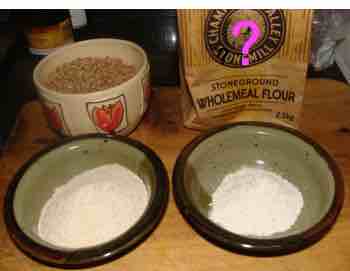
Google "real bread" to understand more about the movement sweeping the UK; folk who are tired of eating tasteless commercial-loaves that manufacturers claim are nutritionally enriched.
All of this is central to the meaning of gluten; it's the protein in wholemeal flour.
Summary
If you are gluten intolerant you may be able to have your cake and eat it; you will have to learn to ferment the dough and bake your own bread. Once you get into the swing of it, it takes only five-minutes; we do it every day.
Sourdough bread tastes divine and has no need for the processed meats and sugary jams that the supermarket loaf demands. And it is rich in the vitamins and bran our bodies must have.
It is interesting the heart attacks were virtually unknown until one hundred and fifty years ago when bakers started refining flour; and extracting the anticoagulant vitamin-E.
Understanding the meaning of gluten is about great tasting bread but more importantly concerns well-being; we think it is absolutely worth the five minutes spent every day.
To do it properly though you need an electric flour mill and a friendly farmer who will sell you bags of grain straight from the silo. Then your sourdough bread costs almost nothing; except for five minutes of your time every day.
Start with the best "wholemeal" from the supermarket and then consider going the next step; flour mills are expensive but our Hawo is 30 years old and has paid itself off many times over. It's busy every single day.
There is a new generation of electric grinders called Mockmills that are cheaper and process the wheat more finely apparently. I have no experience of them. Never buy one that you cannot disassemble; the stones may need to be cleaned periodically.
Type "electric flour mill" into Site Search in the main menu.

As you can see the meaning of gluten is a complex subject; milling your own home bake bread flour is only for those who are passionate about their well-being and love the taste of good food.
Grains with gluten
- Wheat
- Barley
- Rye
- Spelt
- Bulgur
Grains without gluten
- Oats
- Quinoa
- Rice
- Maize, also known as corn
- Sorghum
- Buckwheat
Foods with hidden gluten
|
|
Take home
The take-home when analysing the meaning of gluten is that whole grains are strongly associated with greater wellness; avoiding them just because you think you may be sensitive to wheat makes you prone to nutritional deficiencies and obesity. This is especially true if you instead use refined rice or potato flour, for example.
Vitamin E for example is quite difficult to get in adequate amounts, especially all eight tocopherols. If you avoid whole-grains you are likely to become deficient; it is one of the chief causes of premature frailty[5], fertility problems and stroke.
Absolutely avoid the commercially packed gluten-free foods. Rather replace the wheat with more fruit and vegetables; legumes, unrefined oats or maize too.
- Intestinal digestive resistance of immunodominant gliadin peptides
- Sourdough Bread Made from Wheat and Nontoxic Flours and Started with Selected Lactobacilli Is Tolerated in Celiac Sprue Patients
- Glyphosate, pathways to modern diseases II: Celiac sprue and gluten intolerance
- Sourdough bread recipe
- Frailty and vitamin E
- Whole grains @ Harvard school of public health.
When browsing use right click to follow a link, and open in a new tab, or you may get a bad gateway signal.
What exactly is gluten and why is it bad?
Gluten is the protein in wheat; it is formed when two compounds in flour combine with water.
Gluten is only bad for about 1% of the population; for the rest it's an extremely good form of protein. Unfortunately through ignorance it is blamed for every pain in the tum after eating a meal which contains wheat flour products and especially bread.
Currently nearly a half of Americans are trying to avoid gluten; needlessly.
Did you find this page interesting? How about forwarding it to a friendly book or food junkie? Better still, a social media tick would help.
- Homepage
- Gluten
Address:
56 Groenekloof Rd,
Hilton, KZN
South Africa
Website:
https://www.bernard-preston.com